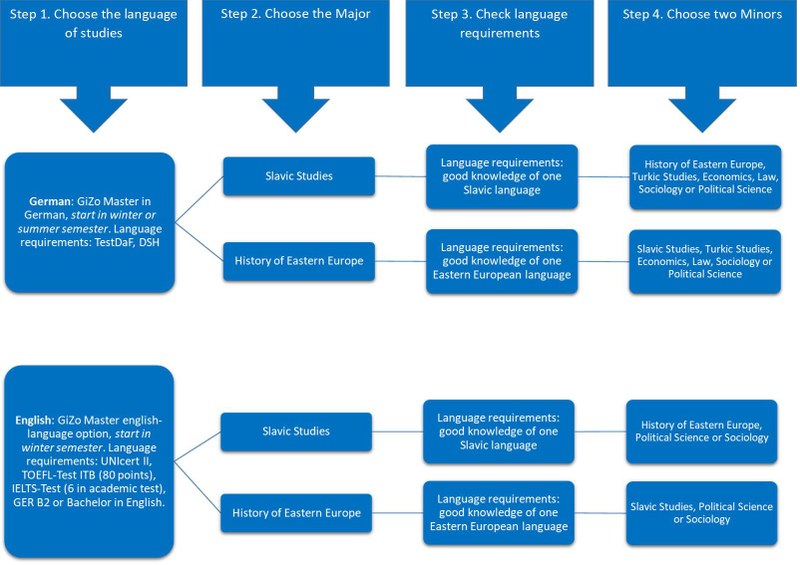Interdisciplinary Studies on Eastern Europe (M.A.)
Overview
- Overview
-
Starting in WS 2022/23 the M.A. in Interdisciplinary Studies on Eastern Europe will be available in German or English. The available minor fields of study differ in the English and German options. See the “Composition of the Study Program” tab for more information.
The aim of the study program is to impart interdisciplinary cultural and methodological competencies related to Eastern Europe. Cultural, historical, legal, political, and economic processes in Eastern Europe are analyzed, considered, and evaluated. Students will learn about and critically evaluate various models and theories, as well as develop their scientific judgment and linguistic expression and communication skills. Students will carry out independent analyses of complex issues and will plan, implement, and evaluate an independent research project on Eastern Europe.
Program Features:-
interdisciplinary cultural competence related to Eastern Europe as well as comprehensive methodological competencies in various fields
-
an introduction to interdisciplinary research on Eastern Europe at the beginning of your studies
-
occupational and practical training through project work and internships with an international perspective
-
research and teaching covering all regions of Eastern Europe
-
a broad historical focus in teaching on Eastern Europe, from the Middle Ages to the present day
Duration of Studies
4 Semesters - 120 Credit Points
Accreditation
since 21.08.2007
-
Composition of the Study Programme
- Composition of the Study Programme
-
Composition of the Study Programme
The 2-year Masters’ program (120 CP) consists of a major subject (50 CP) and two minor subjects (20 CP each), and is completed by a Masters’ thesis in the major subject (30 CP). The Masters’ thesis should be interdisciplinary. The following subjects can be selected:
Major Subjects:
- History of Eastern Europe
- Slavic Studies
Minor Subjects:
- History of Eastern Europe
- Slavic Studies
- Political Science
- Sociology
Law (German option only)
Economics (German option only)
Turkic Studies (German option only)

Modules
Your curriculum depends on the chosen subjects (major and minor). You can find further information in the "Programme Structure", which is part of the study regulations: (will be linked here soon)
Further Information
A description of the modules can be found in the Special Regulations: (will be linked here soon)
Courses Offered in the Course Catalogue
Application
- Application
-
Commencement of Studies
The German option may be started in the winter or summer semester. The English option can only be started in the winter semester.
Admissons Requirements
For the German study option students will need to take the DSH or TestDaF.
For the English study option students will need the UNIcert II, TOEFL-Test ITB (80 points), IELTS-Test (6 in academic test), a B.A. degree from an English-language institution or other proof of English at the B2 level or higher.
Additional language requirements depend on the major field:
-
for the Slavic Studies major, very good knowledge of a Slavic language
-
for the History major very good knowledge of an eastern European language
Application
-
The degree program is not admission limited; there is no cap on admissions.
-
The application period starts in June for the Winter Semester.
-
The end of the application period changes every year; please see the Application Portal for more details.
International applicants should apply through uni-assist as soon as possible.
-
Contact
- Contact
-
Dr. Aksana Braun
Giessen Center for Eastern European Studies
Otto-Behaghel-Str. 10 house E
35394 Gießen
(Philosophikum I)Geschaeftsfuehrung@gizo.uni-giessen.de
Phone: +49 (0)641 99 311 66
Fax: +49 (0)641 99 311 67Facebook page of GiZo
Instagram page of GiZo
